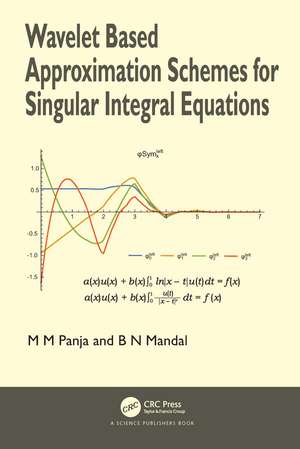Wavelet Based Approximation Schemes for Singular Integral Equations
Autor Madan Mohan Panja, Birendra Nath Mandalen Limba Engleză Paperback – 15 feb 2022
Widely used methods include: Finite Difference Method (FDM), Finite Element Method (FEM), Finite Volume Method (FVM) and Galerkin Method (GM). Unfortunately, none of these are versatile. Each has merits and limitations. For example, the widely used FDM and FEM suffers from difficulties in problem solving when rapid changes appear in singularities. Even with the modern computing machines, analysis of shock-wave or crack propagations in three dimensional solids by the existing classical numerical schemes is challenging (computational time/memory requirements). Therefore, with the availability of faster computing machines, research into the development of new efficient schemes for approximate solutions/numerical simulations is an ongoing parallel activity. Numerical methods based on wavelet basis (multiresolution analysis) may be regarded as a confluence of widely used numerical schemes based on Finite Difference Method, Finite Element Method, Galerkin Method, etc. The objective of this monograph is to deal with numerical techniques to obtain (multiscale) approximate solutions in wavelet basis of different types of integral equations with kernels involving varieties of singularities appearing in the field of elasticity, fluid mechanics, electromagnetics and many other domains in applied science and engineering.
| Toate formatele și edițiile | Preț | Express |
|---|---|---|
| Paperback (1) | 467.27 lei 6-8 săpt. | |
| CRC Press – 15 feb 2022 | 467.27 lei 6-8 săpt. | |
| Hardback (1) | 817.76 lei 6-8 săpt. | |
| CRC Press – 25 sep 2020 | 817.76 lei 6-8 săpt. |
Preț: 467.27 lei
Preț vechi: 584.08 lei
-20% Nou
Puncte Express: 701
Preț estimativ în valută:
89.44€ • 97.18$ • 75.18£
89.44€ • 97.18$ • 75.18£
Carte tipărită la comandă
Livrare economică 21 aprilie-05 mai
Preluare comenzi: 021 569.72.76
Specificații
ISBN-13: 9780367565541
ISBN-10: 0367565544
Pagini: 300
Ilustrații: 58 Tables, black and white; 23 Illustrations, color; 29 Illustrations, black and white
Dimensiuni: 178 x 254 x 16 mm
Greutate: 0.53 kg
Ediția:1
Editura: CRC Press
Colecția CRC Press
ISBN-10: 0367565544
Pagini: 300
Ilustrații: 58 Tables, black and white; 23 Illustrations, color; 29 Illustrations, black and white
Dimensiuni: 178 x 254 x 16 mm
Greutate: 0.53 kg
Ediția:1
Editura: CRC Press
Colecția CRC Press
Cuprins
Introduction
Singular integral equation
MRA of Function Spaces
Multiresolution analysis of L2(R)
Multiresolution analysis of L2([a, b] ⊂ R)
Others
Approximations in Multiscale Basis
Multiscale approximation of functions
Sparse approximation of functions in higher dimensions
Moments
Quadrature rules
Multiscale representation of differential operators
Representation of the derivative of a function in LMW basis
Multiscale representation of integral operators
Estimates of local Holder indices
Error estimates in the multiscale approximation
Nonlinear/Best n-term approximation
Weakly Singular Kernels
Existence and uniqueness
Logarithmic singular kernel
Kernels with algebraic singularity
An Integral Equation with Fixed Singularity
Method based on scale functions in Daubechies family
Cauchy Singular Kernels
Prerequisites
Basis comprising truncated scale functions in Daubechies family
Multiwavelet family
Hypersingular Kernels
Finite part integrals involving hypersingular functions
Existing methods
Reduction to Cauchy singular integro-differential equation
Method based on LMW basis
Singular integral equation
MRA of Function Spaces
Multiresolution analysis of L2(R)
Multiresolution analysis of L2([a, b] ⊂ R)
Others
Approximations in Multiscale Basis
Multiscale approximation of functions
Sparse approximation of functions in higher dimensions
Moments
Quadrature rules
Multiscale representation of differential operators
Representation of the derivative of a function in LMW basis
Multiscale representation of integral operators
Estimates of local Holder indices
Error estimates in the multiscale approximation
Nonlinear/Best n-term approximation
Weakly Singular Kernels
Existence and uniqueness
Logarithmic singular kernel
Kernels with algebraic singularity
An Integral Equation with Fixed Singularity
Method based on scale functions in Daubechies family
Cauchy Singular Kernels
Prerequisites
Basis comprising truncated scale functions in Daubechies family
Multiwavelet family
Hypersingular Kernels
Finite part integrals involving hypersingular functions
Existing methods
Reduction to Cauchy singular integro-differential equation
Method based on LMW basis
Notă biografică
M M Panja has a MSc in Applied Mathematics (1987) from Calcutta University, India, and a PhD (1993) from Visva-Bharati University, India. He investigated the origin of (hidden) geometric phase on quantum mechanical problems and initiated studies on Lie group theoretic approach of differential equations during his postdoctoral research. His investigations (2007) on approximation theory based on multiresolution analysis, has been published several international journals. His current research interests are (i) multiscale approximation based on wavelets, and (ii) similarity (exact) solution of mathematical models involving differential and integral operators.
B N Mandal has a MSc in Applied Mathematics (1966) and a PhD (1973) from Calcutta University, India. He was a postdoctoral Commonwealth Fellow at Manchester University, 1973-75. He was faculty at Calcutta University, 1970-89 and later at Indian Statistical Institute (ISI), Kolkata, 1989-2005. He was a NASI Senior Scientist, 2009-14 in ISI. His research work encompasses several areas of applied mathematics including water waves, integral transforms, integral equations, inventory problems, wavelets etc. He has published a number of works with reputable publishers. He has supervised PhD theses of more than 20 candidates and has more than 275 research publications.
B N Mandal has a MSc in Applied Mathematics (1966) and a PhD (1973) from Calcutta University, India. He was a postdoctoral Commonwealth Fellow at Manchester University, 1973-75. He was faculty at Calcutta University, 1970-89 and later at Indian Statistical Institute (ISI), Kolkata, 1989-2005. He was a NASI Senior Scientist, 2009-14 in ISI. His research work encompasses several areas of applied mathematics including water waves, integral transforms, integral equations, inventory problems, wavelets etc. He has published a number of works with reputable publishers. He has supervised PhD theses of more than 20 candidates and has more than 275 research publications.
Descriere
The objective of this monograph is to deal with numerical techniques to obtain (multiscale) approximate solutions in wavelet basis of different types of integral equations with kernels involving varieties of singularities appearing in the field of elasticity, fluid mechanics, electromagnetics and in applied science and engineering.
